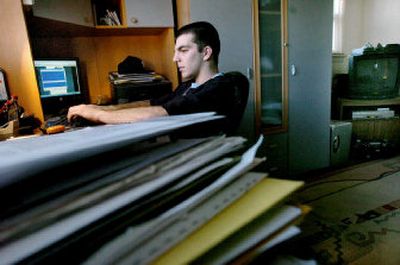Teens losing snoozes

HACKENSACK, N.J. – It’s midnight. Do you know where your teenagers are?
They’re up in their bedrooms, IM-ing their friends, surfing the Net, playing Halo and watching Letterman. Or maybe conjugating French verbs or reading about the Industrial Revolution.
Doing anything, that is, except what they ought to be: sleeping.
America’s teens are chronically sleep-deprived, according to the National Sleep Foundation’s annual poll. Only one in five gets the recommended nine hours of sleep on school nights, and by the time they reach their senior year of high school, many are missing out on 12 hours of sleep a week.
Just ask Max Zaydes. The 17-year-old high school senior stayed up until 4:40 a.m. on a recent Thursday working on a science project, then got up at 7, missing his 7:05 gym class. “That was bad,” he said. “Thursday was pretty rough.”
“We talk about a sleep debt,” says Dr. Terry Carbone, head of The Center for Sleep Medicine at The Valley Hospital in New Jersey, of the adolescents she treats. “I tell them, ‘You never repay a sleep debt!’ And you don’t.”
The consequences of exhaustion are measured in school tardiness, missed homework assignments and nodding heads in class.
“I had a friend who laid her head down on the desk and fell asleep, and she didn’t wake up when the bell rang,” says Alicia Buksar, another high school senior. “The kids walked out and left her there. Finally the teacher went over and said, ‘Excuse me, I think you need to go to your next class.”’
Lack of sleep contributes to lower grades, depression and less participation in exercise.
It also contributes to danger on the roads: More than half of young drivers have driven drowsy in the past year, and 15 percent say they drive drowsy at least once a week, according to the poll.
“They’re endangering their own lives and the lives of their classmates, who are often in those cars with them,” Carbone says.
A driver who has been up for 18 hours performs at the same level on a driving test as a person who is legally drunk, she says.
Some of her patients have such trouble waking up that their parents have chosen to home school them, so they can sleep in.
Most teens miss sleep because of the normal changes of adolescence, compounded by distraction. Sleep specialists speak of circadian rhythms, or the body’s internal clock. As children reach their teens, that clock shifts: They are wider awake later at night, and prone to sleep later in the morning. This “phase delay” makes it difficult to fall asleep before 11 p.m.
School schedules, on the other hand, are built around busing needs and plans for daylight sports events, among other things. Most teens must get up around 6:30 or 7 a.m. to make it to school on time.
This leads to epic early-morning battles.
After Fran Holuba, turned off her alarm three times one morning last year, her mother stepped in. “Frannie, I know you’re tired, but you’ve got to get up.” She still missed the bus. “That was World War III,” the high school senior says ruefully. “I ended up calling Ridgewood Taxi and paying $20 to go to school.”
Alicia Buksar’s younger brother Ryan, 15, usually gets to school on time, but first-period geometry is brutal. Teachers should recognize the symptoms: head drop and drool. “Sometimes my head almost hits the book,” he says.
For many teens, the relentless schedule of extracurricular activities and homework just doesn’t leave time for enough rest.
“Here was my Monday,” said Holuba, who is in the top 10 percent of her class. “Wake up at 6 a.m., shower, eat and go to school. After school, I had lacrosse till 5:45 p.m., got home at 6,” for a quick bite. Then she returned to school for a choir rehearsal, arrived home again at 8:45, showered, ate and began her homework at 10. Two hours later she went online to chat with friends.
She didn’t crawl into bed until 1:30 a.m., only to start again 4 1/2 hours later.
“A teen’s sleep is what loses out,” in the tug-of-war between early school starts and the tendency to stay up late, says Jodi A. Mindell, co-chair of the National Sleep Foundation’s poll task force. “Sending students to school without enough sleep is like sending them to school without breakfast.”
Teens shouldn’t think they can make it up with long naps or weekends in bed. Max Zaydes, the high school senior, sleeps from 4 p.m. till his mother gets home at 6:30 p.m. Fran Holuba sleeps all day Sunday. “My friends know not to mess with me,” she says.
The 8.9 hours of sleep teenagers average on weekend nights just meets the optimum needed, the telephone poll of 1,600 parents and their teens found. And some kids don’t even have that option: Yon Jin Koh, 14, of Ho-Ho-Kus gets up on Saturday mornings to go to an educational institute for additional classes.
What surprises Carbone is how clueless parents are about their children’s sleep habits. Overall, 90 percent of parents polled felt their teens were getting enough sleep at least a few nights a week.